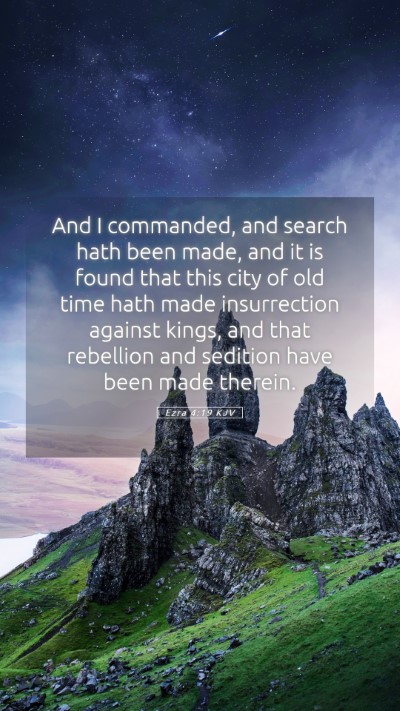Old Testament
Genesis Exodus Leviticus Numbers Deuteronomy Joshua Judges Ruth 1 Samuel 2 Samuel 1 Kings 2 Kings 1 Chronicles 2 Chronicles Ezra Nehemiah Esther Job Psalms Proverbs Ecclesiastes Song of Solomon Isaiah Jeremiah Lamentations Ezekiel Daniel Hosea Joel Amos Obadiah Jonah Micah Nahum Habakkuk Zephaniah Haggai Zechariah MalachiEzra 4:19 Meaning
What is the meaning of Ezra 4:19?
And I commanded, and search hath been made, and it is found that this city of old time hath made insurrection against kings, and that rebellion and sedition have been made therein.
Ezra 4:19 Bible Verse Meaning
Understanding Ezra 4:19 - Bible Verse Commentary
The verse Ezra 4:19 forms a part of a significant narrative in the Old Testament concerning the rebuilding of Jerusalem and its temple after the Babylonian exile. This commentary seeks to offer a comprehensive understanding of this verse through insights from public domain commentaries including those by Matthew Henry, Albert Barnes, and Adam Clarke.
Verse Quote
“And I gave order, and they searched in the book of the records of the days of old; and found that this city was a rebellious city, and hurtful unto kings and provinces, and that they have moved sedition within the same of old time: for which cause was this city destroyed.” (Ezra 4:19)
Context of Ezra 4:19
In the context of Ezra chapter 4, this verse addresses the opposition the Jewish people faced while rebuilding their city and temple. Opposition arose from local adversaries who sought to halt their progress by accusing them of rebellion and sedition. Understanding this context is crucial for interpreting the verse accurately.
Historical Significance
Matthew Henry emphasizes the historical backdrop of the Jewish exiles returning to Jerusalem and the challenges they faced. This verse highlights how their opponents leveraged historical records to discredit their intentions, reflecting the political volatility of the period.
Key Insights from Commentaries
-
Matthew Henry:
Henry points out that the search for records indicates the lengths to which enemies of the Jewish people would go to destroy their efforts. The mention of sedition serves to delimit the generally admired goals of rebuilding, showcasing how false narratives can undermine legitimate projects.
-
Albert Barnes:
Barnes provides a detailed analysis of the term “rebellious,” noting that it carried weight during this time since it could lead to severe repercussions from those in power. By highlighting past rebellions, adversaries sought to frame the rebuilding efforts as a danger to the stability of the region.
-
Adam Clarke:
Clarke elaborates on the historical context from a perspective of theological implications. He notes that the city’s previous rebellion led to its destruction, linking the return and efforts to rebuild as a fulfillment of prophecy. This connection underscores the significance of perseverance in faith against external opposition.
Meaning and Application
The verse serves not only as a historical account but also as a lesson in integrity and resilience in faith. The accusations against the Jews present a broader theme seen throughout Scripture: the challenges of maintaining faith amid significant opposition. The insights from the commentaries illuminate how history can be weaponized and the importance of understanding our past as we navigate our present circumstances.
Reflection on Modern Applications
For contemporary readers, the passage encourages reflection on how to deal with criticism and opposition when striving to fulfill perceived divine calls or personal missions. Just as the Israelites had to contend with misrepresentation, believers today often face misunderstanding in various contexts, such as work, community, or within their own families.
Related Bible Cross References
- Nehemiah 4:1-3: Opposition faced during the rebuilding of Jerusalem's walls.
- Daniel 6:5: Accusations forming against those who serve faithfully.
- Acts 5:28-29: The apostles being accused of disobedience for preaching the Gospel.
Conclusion
The understanding of Ezra 4:19 as illuminated by these commentaries provides deep insights into not only the historical context but also applicable lessons for today’s reader. The ongoing interpretation of this verse is essential for those engaging in Bible study groups, online Bible study, or seeking Bible study tools for a more profound grasp of Scripture and its meanings.
As believers seek to understand Scripture, Ezra 4:19 stands as a testament to the challenges faced by those faithful to God's call amid adversity. The richness of biblical exegesis encourages ongoing exploration of the meaning of Bible verses, ensuring that individuals are better equipped to apply these lessons to daily life.


